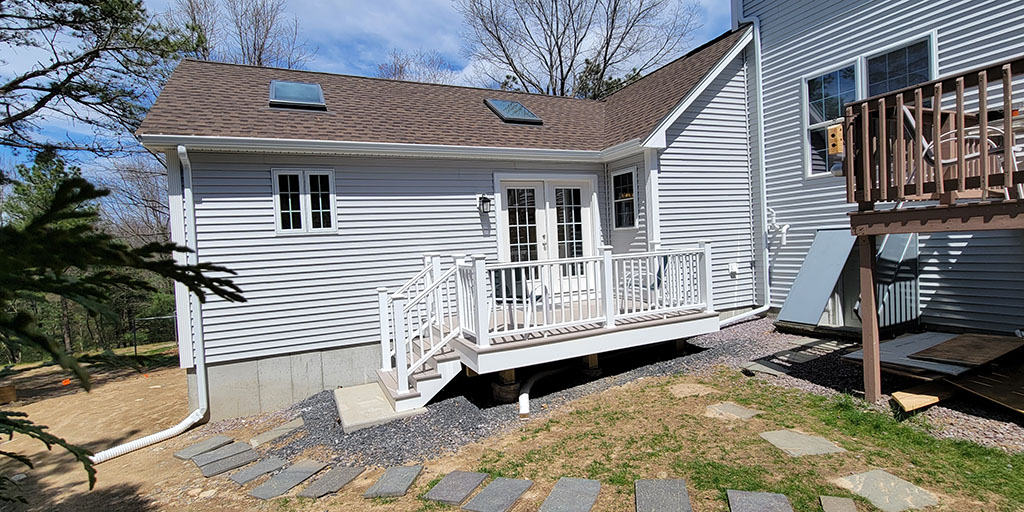Can You Add an In-Law Apartment to Your Massachusetts Home?

Adding an in-law apartment addition, also known as an accessory dwelling unit, to an existing house in Massachusetts can be an affordable alternative to buying a new home.
Multi-generational living is becoming more common across many Massachusetts communities. Many cities and towns have made it easier to get permits for additions that add a bedroom, kitchen, bathroom and living area to an existing home, even if it is located in a single-family zoned neighborhood. Some communities even allow these types of projects by-right, meaning there is no need for a zoning variance before applying for a building permit.
The option of adding an accessory dwelling unit, or ADU as they are often referred to in zoning bylaws, can help family members, both young and old, stay in a community that they already are a part of and love without being priced-out by the rising cost of purchasing a new home. At the same time, carefully crafted zoning bylaws can insure that the character of single-family neighborhoods maintain their character and appeal while still allowing for these types of generational or caretaker living arrangements.
What is an accessory dwelling unit?
Sometimes called a mother-in-law suite or addition, the official name is an accessory dwelling unit. ADUs are typically self-contained apartments or small detached dwellings that are located on the same lot as the main dwelling structure. The units are usually occupied by family or a caregiver of the occupant of the primary residence.
These types of home additions are made to be permanently occupied, and to offer all of the amenities that you would expect from a small-to-moderately sized living space, such as an apartment or condominium. Typically they will include a bedroom, a kitchen, a bathroom and a living room. An ADU will usually have its own entrance in the back or side of the new structure.
What's in a name?
Here are some other names for accessory dwelling units:
- ADU, ADUs
- In-law apartment or unit
- Mother in law apartment or unit
- Granny unit or flat
- Guest house
- Carriage house
- Secondary suite or unit
- Garden suites
- Accessory apartment
- Ancillary unit
- Backyard cottage
- Multi-generational home
Zoning bylaws related to ADUs in Massachusetts
Many municipalities that allow these types of additions to an existing single-family residential home have specific requirements that must be met in order to be approved and have a permit issued.
Some common zoning requirements you and your contractor may face when undertaking this type of project are as follows:
- The new unit Must be attached to the existing house.
- Only a family member or caregiver may occupy the ADU. Note: nannies and au pairs can be considered caregivers in some Massachusetts cities and towns.
- A deed restriction may need to be filed with the Registry of Deeds before a building permit is issued. The deed restriction would typically state who is allowed to occupy the ADU based on their relation to the primary resident: family member, caregiver, etc.
- The new unit must be accessible with unrestricted access from the interior of the existing dwelling unit.
- The city or town may issue an occupancy permit for the ADU that must be renewed after a certain period of time has passed. For example in Needham an occupancy permit must be renewed every 3 years for an ADU.
- The city or town may limit the maximum size of the by-right ADU. Medway limits the size to 850 square feet unless the homeowner applies for and is granted zoning relief to create a larger Accessory dwelling unit.
Cost savings vs buying or building a new house
Building an accessory dwelling addition will almost always cost far less than buying a new home that has comparable living space and amenities.
Let's break it down:
- You already own the land.
- You already have services coming to the house, such as: electric service, cable/internet, gas service, Water service. These services simply need to be extended, which is far less expensive than running new services from the street.
- If you have town/city sewer (or a septic system that can handle an additional bedrooms), a new sewage hookup should be relatively inexpensive compared to a new installation.
- The site work has already been done on the lot and we just need to address the site work for the additional structure.
- The existing driveway is usually able to be used as off-street parking for the ADU as well.
Let's get building!
I love these types of projects and at Johnson Construction we're experts at navigating through the construction process from plan design through construction completion, we handle everything and make it a smooth process for our customers. Are you ready to get building? You can contact me here to discuss your project. I can't wait to talk to you about it!
About the Author:
Joshua Johnson (josh@johnsonremod.com) is the owner of Johnson Construction & Remodeling and has been a licensed contractor in Massachusetts since 2004.
Johnson Construction provides: additions, decks, kitchens, bathrooms, basements and more. Their service area includes Norfolk County, Middlesex County and parts of Worcester County. You can contact him and request an estimate here.
TAGS: remodeling - home addition - zoning - adu




